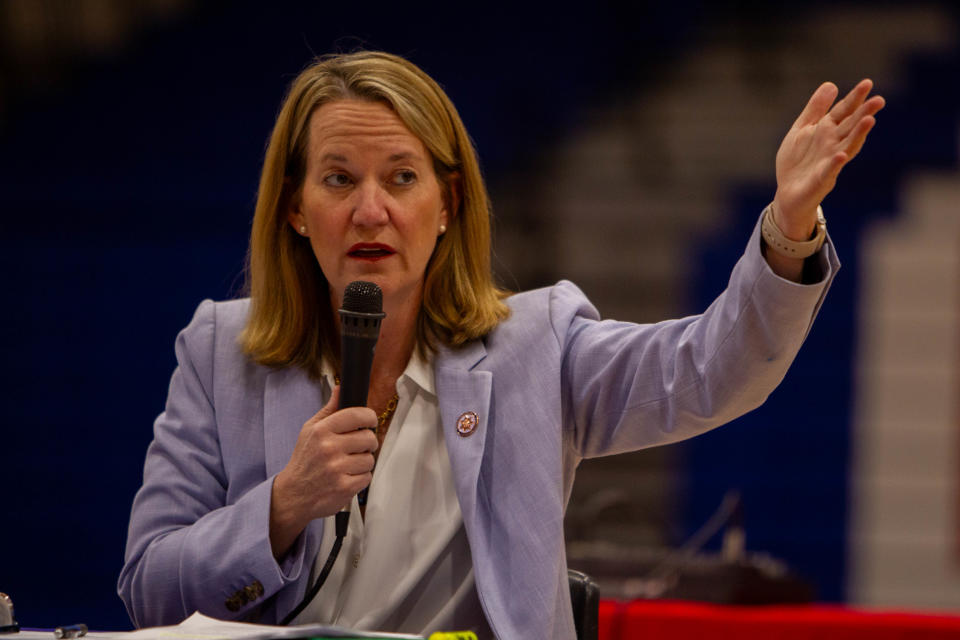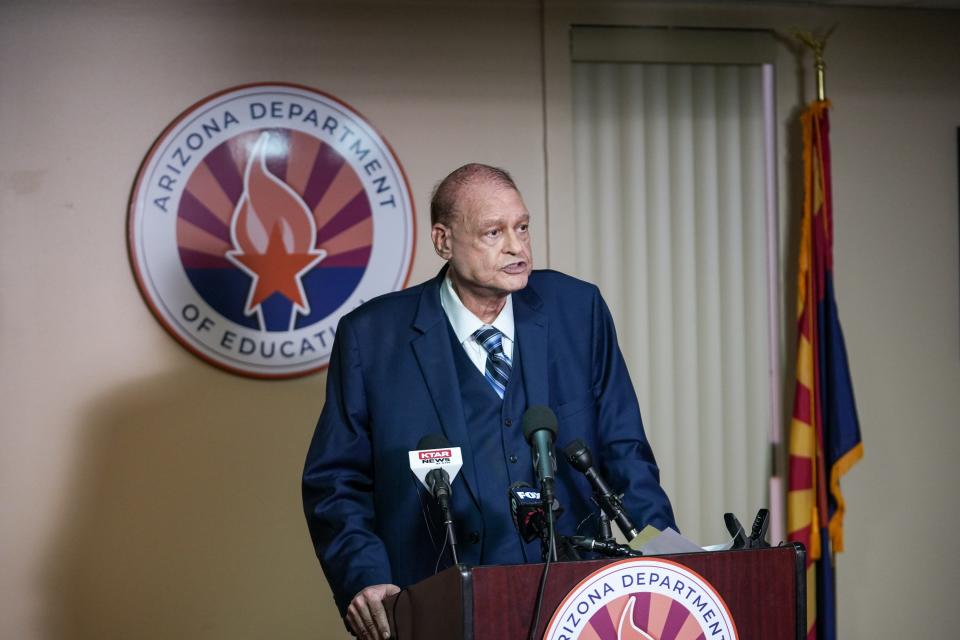Former Department of Education employees accused of defrauding Arizona voucher program
- Oops!Something went wrong.Please try again later.
- Oops!Something went wrong.Please try again later.
A grand jury has indicted five people on charges of defrauding Arizona's education voucher program of at least $600,000, Attorney General Kris Mayes announced.
Mayes said Dolores Lashay Sweet, Dorrian Lamarr Jones, Jennifer Lopez, Jadakah Celeste Johnson and Raymond Lamont Johnson Jr. stand accused of multiple felonies in what she described as an inside job within the Arizona Department of Education's universal voucher program.
Charges include fraud, conspiracy, computer tampering, illegally conducting an enterprise, money laundering and forgery related to the Empowerment Scholarship Account Program.
The charges allege the group — former specialists with the ESA program and their adult children — sought to obtain money and property through the program for personal gain. At a Thursday news conference, Mayes said the investigation was continuing.
"It was very easy for these individuals to do this," she said. "We have to ask the question, 'Are others replicating this?'"
The problem came to light when a credit union notified her office of suspiciously large amounts of money being withdrawn from accounts, Mayes said. Her office started investigating in August; the Education Department fired Sweet in August and Jones and Lopez in November.
The state voucher money was spent on what she called "luxury items," although Mayes did not provide details and suggested some of the money might have paid for actual educational services.
Mayes said the fraud relied on fake birth certificates and falsified proof of a student having special education needs. Vouchers for students determined to have special ed needs are far more generous than the $7,000 that is typical for other students.
Of the 17 children involved in the plot, seven did not exist at all. Five of those students all had the same Aug. 26, 2016, birth date on birth certificates that clearly were altered.
“To put it simply,” Mayes said. “They created ghost students."
“My overarching concern is this is a program that is easy to target for fraud,“ she said.
The indicted individuals were served notice but not arrested. Their initial court appearance was scheduled March 28.

Horne: His department alerted Attorney General's Office to potential fraud
After Mayes' news conference, state schools Superintendent Tom Horne issued a statement saying his department had alerted the Attorney General’s Office in December to potentially fraudulent activity by Jones and Lopez. That followed months after the initial tip to Mayes' office from the credit union.
“The attorney general is not telling the truth when she states that the alleged criminal activities of former ADE employees did not raise flags in the department. In fact, the opposite is true," Horne said.
He said all three employees had been hired by his predecessor "whose oversight of the Empowerment Scholarship Account Program was lax. In fact, it was so loose that when I took office, I faced dozens of parents at State Board of Education meetings furious at me for placing more controls on expenses and spending."
Horne said he had hired a longtime veteran from the state Auditor General’s Office to oversee the financial structure of the ESA program and also a full-time investigator. He made that hire after Christine Accurso, his first pick for program administrator, abruptly resigned in July 2023 after just six months on the job.
“I have absolutely zero tolerance for criminal activity on the part of any employee, contractor or vendor," Horne said.

Horne, a Republican, noted the indicted individuals were hired under former state schools chief Kathy Hoffman, a Democrat, and suggested the fraud started under her watch.
Although the indictment states that the fraud started on or about Oct. 14, 2021, and continued into late 2023, Mayes said she believes the offenses started only after the ESA program was opened to all school-age children in fall 2022. Sweet approved ESA funding for the first student in her alleged scheme in October 2021.
Mayes: Program lacks safeguards, adequate funding for oversight
Mayes decried the Legislature for creating a law with so few safeguards for state money. She also faulted lawmakers for underfunding the Education Department, hampering its ability to cope with a program that had explosive growth.
"I believe it is high time for the Legislature to put regulations in place to prevent the fraud we're seeing today," she said.
She compared the ESA program with the state's Medicaid program, which has recently been rocked by revelations of fake claims that drained millions from the Arizona Health Care Cost Containment System.
Both of those programs deal with a large amount of money without enough oversight, she said.
As of this week, ESA enrollment stands at 75,576 and the average scholarship is $9,782.
Gov. Katie Hobbs and legislative Democrats have pressed for such reforms, but they have been rejected by the Republican majority in the Legislature.
Lawmakers in 2022 expanded the voucher program to cover all Arizona school children. That led to an immediate spike in enrollment, initially driven by parents who already had children in private school using the taxpayer dollars to help cover the tuition that they previously were paying out of pocket.
Since then, the program has grown more slowly and is unlikely to meet predictions from Hobbs and Horne that enrollment will hit 100,000 by late June.
Critics: School voucher program needs additional oversight
Critics of the universal voucher program were quick to point to the indictments as further proof that the program needs oversight.
"As every new headline makes clear, Arizona's ESA voucher program has been a complete disaster," said Marisol Garcia, president of the Arizona Education Association, which represents public school employees.
"It's time to rein in the ESA voucher program before it spins even further out of control," she said.
Save Our Schools, an advocacy organization for the state's public schools, said the indictments should be a clear call for accountability and transparency in a program that has none.
“Nothing about this scandal surprises me," said Beth Lewis, the group's executive director, noting earlier revelations of extravagant but legal expenditures using voucher money.
"We are the laughingstock of the nation," Lewis said of the program, adding most people would support guardrails.
House Speaker Ben Toma, who sponsored the universal expansion bill in 2022, issued a statement chastising critics for condemning a program that is popular with parents because of the actions of several bad actors. Those bad actors were caught, he noted.
"I’m pleased to see today’s indictments for fraud from the Attorney General, which highlights the effectiveness of the state to identify and prosecute fraud," Toma, R-Glendale, said.
Ryan Cantrell, vice president of government affairs for American Federation for Children, which advocates for school choice, said in a statement, “We believe all fraud in our education system should be rooted out. We are glad the system worked.”
2nd set of charges brought by Mayes
It's the second time Mayes' office has sought fraud charges related to the ESA program.
Last year, Mayes' office won an indictment against three women on a combined 25 criminal charges for defrauding the state, including the ESA program. The charges pertain to actions that happened before the Legislature expanded the program to cover all Arizona school children.
The indictment alleged that from July 2017 to July 2020, Michelle Leigh Dils defrauded the state Department of Education of $25,000 from the ESA program. Dils is also alleged to have defrauded the state's Medicaid program, AHCCCS, along with two other women and other unnamed individuals through various businesses they created. Those enterprises included Love Learning LLC, Academic Training AZ, Ace Medical Solutions, All Family Solutions and the Arizona School for exceptional Kids LLC.
The case is pending in Maricopa County Superior Court.
Arizona Republic reporters Nick Sullivan and Madeleine Parrish contributed to this article.
Reach the reporter at maryjo.pitzl@arizonarepublic.com or at 602-228-7566 and follow her on Threads as well as on X, the platform formerly known as Twitter, @maryjpitzl.
Support local journalism. Subscribe to azcentral.com today.
This article originally appeared on Arizona Republic: Former state employees accused of defrauding Arizona voucher program

